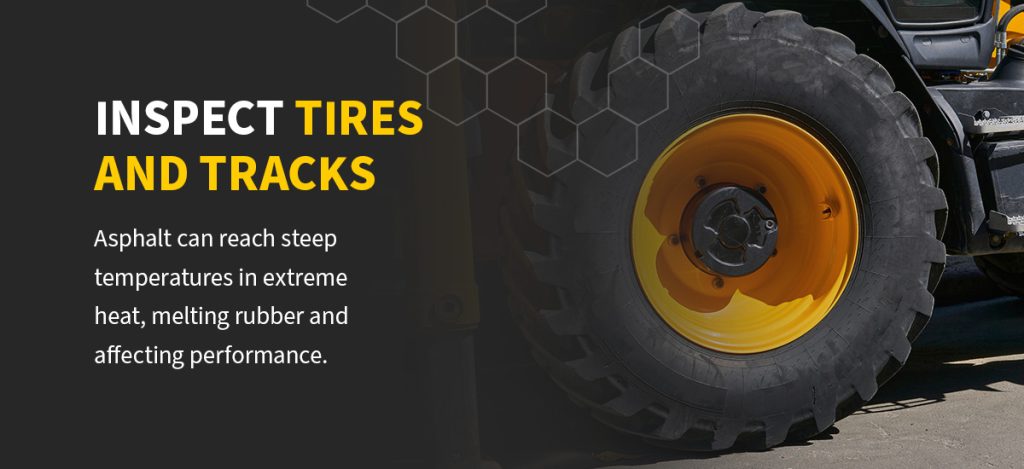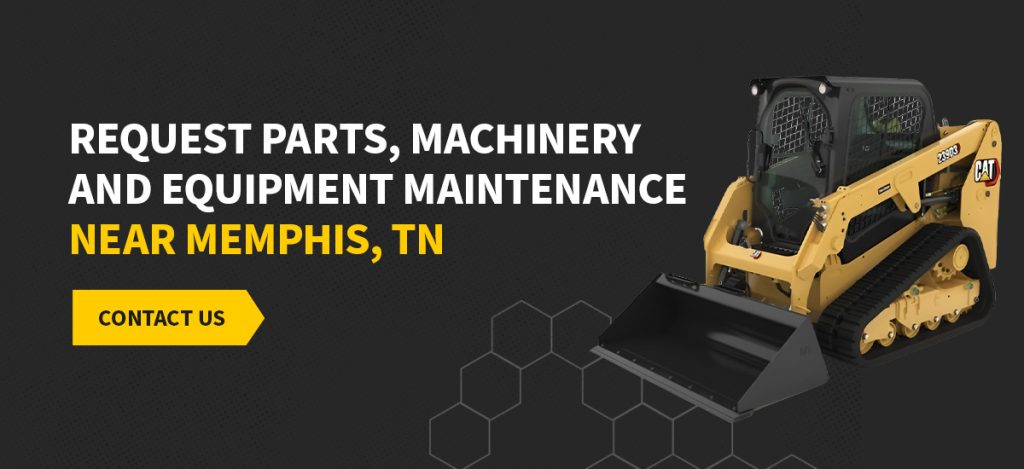
While spring brings more daylight, it also means sweltering Tennessee heat is just around the corner. Heavy equipment that performs well in milder temperatures can overheat or wear down faster. Operators and maintenance crews in Tennessee need to invest in warm-weather maintenance to keep their projects moving.
Use these tips to protect your fleet during the warmest parts of the year.
The Importance of Heavy Machinery Maintenance
Heavy equipment maintenance is essential for keeping equipment working year-round. Extreme temperatures will take their toll on your machinery, reducing fleet effectiveness and driving up costs. Invest in heat-related maintenance to prevent high temperatures from causing extended downtime.
Every machine component needs additional inspection during the summer. Fluids break down, engines run hotter and rubber wears out faster. Your fleet needs daily walkarounds to make sure everything is clean and operational. Invest in heat-focused maintenance to accomplish the following:
- Prevent downtime: Keep equipment running the whole summer by avoiding heat-related damage. Maintenance improves equipment performance and stops problems before they lead to shutdowns.
- Reduce costs: Preventive maintenance is less expensive than unplanned downtime and emergency repairs. Paying for on-site repairs, emergency part shipping and delayed schedules can dip deep into your finances.
- Improve safety: Well-maintained machines run more smoothly and predictably. They protect your team and site from unexpected issues.
Common Heat-Related Issues for Heavy Machinery in Memphis, TN
Tennessee regularly experiences high temperatures. It’s a humid subtropical climate, which means summers are hot and high-moisture. High heat and humidity are challenging conditions for your equipment, reducing its lifespan. You need to know how the heat can affect your machinery so you can prevent problems on the job.
- Engine overheating: As engines operate, they generate heat. Normally, this problem is manageable, but high outdoor temperatures can push engine systems to overheat much faster. It’s common to see engine damage if the overheating is too severe.
- Battery failure: Heavy machinery is adopting lithium-ion batteries for newer equipment. While these batteries are efficient, they can also fail in high temperatures. Corrosion buildup and extended high temperatures shorten your battery life.
- Lubricant breakdown: Extreme heat can also degrade libricants, increasing component wear.
- Hydraulic stress: Heat will thin hydraulic fluid, which decreases hydraulic power. You might also experience increased wear on your hydraulics.
- Tire problems: Hot surfaces can increase tire pressure and wear. It’s common to have more tire blowouts and reduced traction in extreme temperatures.
Tips for Cooling and Protecting Machinery
While it’s impossible to completely prevent high temperatures from affecting your fleet, you can work to minimize the damage. With the right approach, you’ll keep your equipment cool and efficient. Use these tips to protect your machinery during long Tennessee summers:
1. Keep Equipment in the Shade
Sun exposure will increase the rate of equipment overheating. When equipment is not in use, park it in the shade or under protective covers. Canopies and shades give the machinery a chance to cool off out of direct sunlight. Leaving equipment out for hours in direct sunlight means your equipment is still taking on heat-related wear, even if no one is operating it.
2. Clean Cooling Systems and Radiators
Cooling systems work overtime in the summer. As operators use machinery, the cooling system is expending energy and seeing debris buildup. Make sure to blow out debris from the radiators and cooling system daily. Dusty work environments can quickly clog your equipment.
A clogged radiator will lead to overheating, reducing cooling efficiency and increasing system wear. Operators should monitor coolant levels and conditions to ensure everything is working properly.
3. Inspect Tires and Tracks
Hot temperatures create extremely hot surfaces. Asphalt can reach steep temperatures in extreme heat, melting rubber and affecting performance. Over-exposure to these temperatures will crack, separate or blow out your equipment tracks and tires.
Monitor pressure and tension regularly. If your equipment sits idle in hot weather, inspect it for cracks as well. Teams should swap out machinery and visually inspect everything for problems to prevent downtime.
4. Use Heat-Resistant Fluids
Heat can thin or break down your coolant, oil and grease. Your machinery will see increased wear and friction as fluids break down faster. Use lubricants designed for high temperatures, which degrade more slowly than standard fluids. During daily checks, top-up grease points to minimize friction. The better lubricated your components, the less friction and wear you’ll notice.
5. Adjust Operating Hours
If your schedule allows for it, adjust operating hours to avoid the hottest parts of the day. Run your heaviest operations early in the morning or later in the evening.
The middle of the day is when the sun is brightest and the temperature is hottest. Keeping your team out of this window protects the equipment and improves team safety. It can even increase productivity. If equipment and employees stay out of the heat, they’re less fatigued, which lets them work faster when it’s cooler.
6. Avoid Overloading Equipment
Overloading machinery stresses the engine and hydraulics, which increases heat output. The more you overload and overwork equipment, the faster it will break down. Use machinery only at its rated capacity and ensure operators can recognize signs of thermal strain. Swap out machinery to give your most-used equipment a break to prevent downtime.
7. Use Technology for Real-Time Updates
Modern technology like VisionLink® gives you direct insight into equipment performance. VisionLink monitors temperature, maintenance needs and equipment condition to alert you when there’s an issue. Fleet managers can receive alerts for fluid concerns and high temperatures. Catch heat-related problems before they take equipment out of service.
8. Invest in Preventive Maintenance
Adjust your maintenance strategies for hot weather. Services like condition monitoring can give you a complete overview of equipment conditions. This information tells you what to watch for and how to improve machinery for optimal performance. Combine that data with regular preventive maintenance to stay ahead of heat-related wear.
Request Parts, Machinery and Equipment Maintenance Near Memphis, TN
Maintaining a successful operation in the summer starts with investing in reliable equipment and parts from a trusted source. Thompson Machinery is here to help you power through the Tennessee heat. We offer a full line of new and used Cat® equipment for fleet operators.
As the leading Cat heavy machinery company near you, you can count on us to supply equipment built for performance and efficiency. We offer expert service and support, genuine new and used parts, and locations across Tennessee.
Explore our available equipment to get ready for summer!





